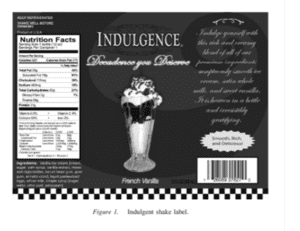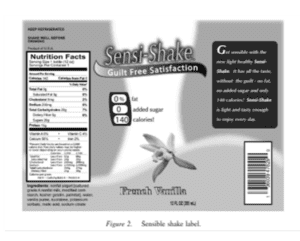Mind Over Milkshakes: how our expectations change reality
The 2011 paper by Alia Crum, William Corbin, Kelly Brownwell, and Peter Salovey titled “Mind Over Milkshakes: Mindsets, Not Just Nutrients, Determine Ghrelin Response” describes how our expectations impact not just how our brain perceives the world, but also the way that our body responds to stimuli.
[Watch our Groove Track Video of this topic here]
For years, we’ve known that our mindsets impact our thoughts and our perceptions, but in this paper, the authors demonstrate how mindsets impact our physical self as well. Their research revealed how people’s beliefs about a milkshake actually changed the amount of ghrelin that their bodies produced.
Ghrelin is a gut peptide that influences how satiated we feel. In other words, it helps us decide if we feel full or if we feel hungry. The more ghrelin you have, the more “hungry” you feel. It also impacts how our body regulates its energy: when low, our metabolic rates rise and we are more likely to use some of our stored energy to keep us going and keep active. When Ghrelin levels are high, our bodies reduce our resting metabolic state – and we tend to feel a bit more lethargic to conserve energy.
In this study, Ghrelin was measured in the study participants via blood samples at three points – prior to consuming, at consumption, and after consumption. The participants did this on two different occasions – one where they thought they were drinking an “indulgent shake” and one where they thought they were drinking a “sensible shake.” It is important to know that everyone had the same shake and it was the same shake on both occasions.
The researchers were manipulating what people believed about the shake.


On one occasion, participants were told to read the label and they saw that the shake was an “Indulgence Shake that had 620 calories overall, of which 270 of them came from fat.” The label expanded on that and said in large letters “Indulge: decadence you deserve! Indulge yourself with this rich and creamy blend of all our premium ingredients – sumptuously smooth ice cream, satin whole milk, and sweet vanilla. It is heaven in a bottle and irresistibly gratifying.”
On the other occasion, they were told that the shake they were drinking was a “Sensi-Shake” and was described this way: “Sensi-shake for guilt-free satisfaction. Get sensible with the new light, healthy Seni-shake. It has all the taste without the guilt – no fat, no added sugar, and only 140 calories. Sensi-shake is light and tasty enough to enjoy every day.”
20 minutes before consumption, Ghrelin measures were the same for both conditions.
However, in anticipation of drinking the shake – i.e., at the moment of consumption, Ghrelin levels were significantly higher in participants when they thought they were about to drink the indulgent shake.
After drinking what they thought was the indulgent shake, their ghrelin count was significantly lower compared to their ghrelin count when they thought they were drinking the sensible shake.
Note that lower levels of Ghrelin relate to feeling more satiated or more full. So after reading the labels, when they were anticipating the indulgent shake, they felt hungrier because they thought they were getting a rich, indulgent shake. So by comparison, after drinking the “indulgent” shake, they felt more full compared to when they were told they were drinking the Sensi-Shake.
The researchers explain it this way, “To be specific, participants exhibited a steeper rise in ghrelin in anticipation of the indulgent shake, followed by a significantly steeper reduction in this biological marker of hunger after consuming the shake. When drinking the shake in an indulgent mindset, participants’ levels of ghrelin reflected a moderate level of physiological craving followed by a significant level of physiological satiety. On the other hand, when drinking the shake in a sensible mindset, participants exhibited flat or slightly increased levels of ghrelin over the course of consumption suggesting that, despite consuming the same nutrient contents, they were not physiologically satisfied.”
If the body was responding only to the caloric content of the shake itself, these levels should have been the same. But they weren’t. The body responded differently based on what was on the label.
The researchers summed up their observations by saying, “However, in this case the distinctive ghrelin profiles were psychologically mediated; they were dependent on the perceived expectancies of the milkshakes’ nutritional contents as opposed to objective nutritional differences.”
Implications:
One of the big takeaways is that our expectations don’t just color the way we cognitively process an experience, the study reveals that our expectations actually impact the way our bodies process an experience. When we are primed for indulgence, our bodies respond like we are having a high-calorie, super-rich shake. And when we are primed to think we are having a sensible shake, our bodies respond accordingly, even when there is no difference between the actual calories in the shakes.
If we generalize this out, the expectations that we hold about our food, our health, our job, and the different products we buy or use, are not just ancillary outputs of our experiences or beliefs, but those expectations are active participants in the experience. The expectations that we hold about these things change how our bodies and mind respond to them. Share on X
Here is another thing to think about from an implications perspective: one of the basic assumptions in economics is that the experienced pleasantness from consuming a good depends only on its intrinsic properties and on the state of the individual. This research shows, at least in some instances, that assumption does not hold true. This means that the marketing that companies do extrinsically influences the experience of the consumption process by changing our expectations of the experience…the evocative car ads, the “just do it” Nike ads, the “Cookoo for Coco Puffs” ads for cereals – they all build those expectations.
Marketers may already know this, but marketing is no longer just about selling the product, but also about how we experience the consumption of the product.
And going beyond that – the internal communication inside organizations – does more than provide information to employees, it sets the scene for how new programs or processes are experienced. Leaders are influencing the actual experience of using a new computer system or sales model just by the way they frame it and the expectations that are created. Now…these are some big generalizations, and we don’t have research (that we know of) to support this yet, but the natural outcome of these findings would suggest broad effects in the working world and our personal lives.
One of the key messages we can take from this study: be careful about your expectations…they will influence not just how you perceive the situation, but also how your body responds to it!
[Watch the Groove Track Video of this here]
References:
http://www.dishlab.org/pubs/Crum%202011.pdf
https://dash.harvard.edu/bitstream/handle/1/3196007/langer_excersiseplaceboeffect.pdf?sequence=1
BEHAVIORAL GROOVES BLOG
- August 18, 2022 Improve Performance Using 12 Action-Oriented Words
- August 4, 2022 Groove Track: Why You Can’t Find a Cab on a Rainy Day!
- July 21, 2022 Mind Over Milkshakes: how our expectations change reality
- April 12, 2022 How One Man’s Social Identity is Inspiring the World
- February 11, 2022 Sweet Regret
- January 12, 2022 How to craft powerful goals – for you and your team!
- January 29, 2021 Being a Catalyst For Change with Jonah Berger (Bonus Track)
- November 13, 2020 The rule of 4 and other hints to improve your life with Roy Baumeister (Bonus Track)
- November 13, 2020 Using priming to improve your life – our interview with Dr. John Bargh (Bonus Track)
- October 23, 2020 Using moral arguments to change opinions with Andy Luttrell (Bonus Track)
- September 29, 2020 Habits vs Routines
- September 29, 2020 Good Prime – Bad Prime
- April 8, 2020 Why toilet paper?











